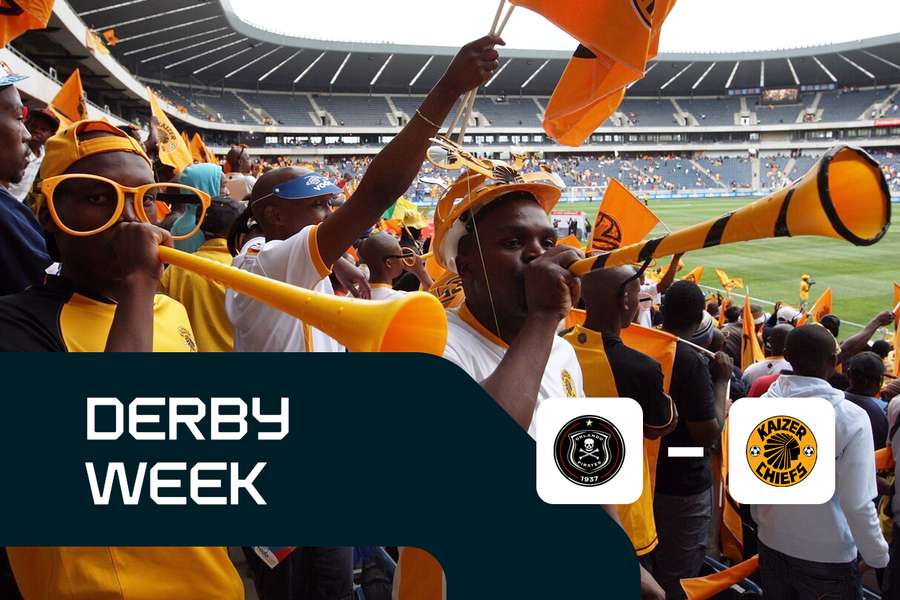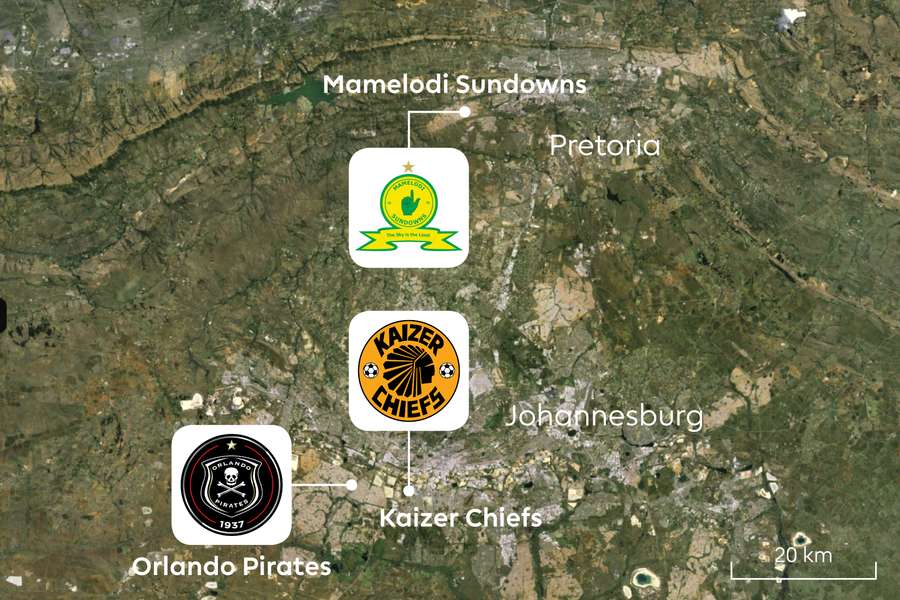Derby Week: A colourful battle in South Africa's footballing heartland of Soweto

South Africa is a hugely interesting, if in some ways very complex, country. Its population of 62 million people encompasses many races, religions, cultures and languages. It has also gone through a period of British colonialism in its history, and to this day, English is still commonly used in public and commercial life. In addition to language and many other aspects of society, the British brought the country's most popular sports to southern Africa.
Although the South Africans are the reigning rugby world champions, football is the most popular sport in the country. Both sports made their way there with the colonisers in the late 19th century. While rugby has remained popular in the predominantly European-descent society, football has caught on with the majority of the local African population.

The first local football association, however, only included white players. Other cultures and races in the country also founded their organisations at its instigation. In 1953, South Africa became one of the first representatives of the continent to gain a seat at a FIFA meeting. There were originally just four African countries (in addition to South Africa, they were Ethiopia, Egypt and Sudan), which then formed the Confederation of African Football (CAF) in 1956.
A step back in time
CAF organised the first Africa Cup of Nations (AFCON for short) a year later. However, the South African team was disqualified from it. This was because the country's constitution prohibited racially mixed sports teams under the policy of racial segregation (known as 'apartheid'). Thus, the only option was to send either an all-white or an all-black team to the championship. CAF opposed this and did not allow the country to participate in the first championship.
Of course, it was not only football that was segregated in South Africa. The issue of dividing groups was deeper and much more fundamental. Restrictions and rules included, for example, separate means of transport for white and so-called 'coloured' people. Some groups were not allowed to go to restaurants, cinemas, parks, beaches. Schools, hospitals and even public spaces were also separated between racial groups.
After the end of apartheid, South Africa as a country began to prosper more and more. And football has also made progress there. In 1996, the South African national team (already united, made up of the best players regardless of race) won AFCON. In 2010, South Africa even hosted the World Cup. It was a historic moment as the most globally watched (not only) sporting event was held in Africa for the first time. Moreover, the hosts did not do badly at the event. They drew with Mexico in the group stage and even beat France, but still failed to qualify for the knockout stages.
The Soweto derby
The most successful South African club is Mamelodi Sundowns from the suburbs of Pretoria, which has won 13 championship titles in the modern South African league (operating since 1996). Their main rivals are two clubs from the Johannesburg suburb of Soweto.
One of them is Orlando Pirates, a club that ranks among the oldest in the country. It was founded in 1937 by a group of teenagers in Orlando, a suburb of Soweto. In the 1960s, a great talent emerged in the Pirates' ranks. His name was Kaizer Motaung and, by the age of 16, he was dazzling with his performances in South African competitions. So much so that he was scouted by the fledgling North American Football League. Motaung actually made the move overseas, played for the Atlanta Chiefs and helped the team to the title in his and the league's first season. He even became the league's top scorer the following year.
When he returned home in 1970, he fell out with the management at his former home in Orlando and decided to start his own club. He named it partly after himself and partly after his home town in the USA - Kaizer Chiefs. Somewhat oddly, the Chiefs took on a Native American symbolism alongside the name from Atlanta. Motaung currently serves as the club's chairman.
In recent years, the Soweto teams have dropped off in South African football. The Pirates won their last title back in 2012 and the Chiefs three years after that. Currently, however, the bitter rivals are very close in the table and within striking distance of second place. Orlando won the first Soweto derby of the season but who will succeed in the rematch and claim the bragging rights? The match kicks off on Saturday, March 9th at 14:30 CET.
Other derbies this week:
Thursday, March 7th
Mexico / CONCACAF Champions League
CD Guadalajara vs Club America
El Clásico de clásicos
The two biggest cities, the two biggest clubs - Club America from Mexico City have 14 titles to their name, CD Guadalajara have 12. Mexican football's biggest rivals will face off in the CONCACAF (Confederation of North, Central American and Caribbean Association Football) Champions League last 16.
Friday, March 8th
Egypt - Egypt Cup (Cup)
The Cairo derby
Al Ahly and Zamalek are the most successful not only in Cairo and throughout Egypt, but also throughout Africa. They are the two clubs with the most titles in Egypt (Al Ahly 43, Zamalek 14) and in the African Champions League (Al Ahly 11, Zamalek 5). They will now compete for the Egyptian Cup (which both rivals have also won several times - Al Ahly 38 times, Zamalek 28 times).
Netherlands - Eerste Divisie (2nd league)
The Northeast Brabant derby
Both rivals are based in the northeastern part of the province of North Brabant. Den Bosch is from the provincial capital 's-Hertogenbosch (whose name is simplified to just Den Bosch). Club TOP is from the town of Oss, located about 20 km further east. This is also a derby between teams at the top of the table.
Ireland - Premier Division
The Northside derby
The stadiums of rivals Bohemians and Shelbourne lie just two kilometres apart in Dublin. Both Northside derby participants are among the most successful Irish clubs in history. The rivalry between them reached a peak in the early 21st century, with one or the other winning the title in six consecutive seasons.
Saturday, March 9th
Indonesia - League 1
The classic duel
Persib is based in Bandung, Persija in Jakarta. The two cities are located in the western part of the island of Java 150 km apart. Both clubs are multiple Indonesian champions - Persija have won 11 titles, Persib seven. Their rivalry was recounted in a previous Derby Week. The first derby of the season ended in a 1-1 draw.
Czech Republic - FORTUNA:LIGA
Hradec Kralove vs FK Pardubice
The East Bohemian derby
Hradec Kralove and Pardubice, two East Bohemian cities, are separated by only 20 km. Naturally, there is a strong rivalry between them. The two cities compete mainly in ice hockey, but also in football, in which they are competing for only the sixth time on the first-league stage. The record so far is slightly in favour of Pardubice (two wins, two draws, one defeat).
Germany - Bundesliga
Borussia Monchengladbach vs 1. FC Koln
The Rhine derby
Multiple clashes between clubs based in North Rhine-Westphalia are referred to as the 'Rhine Derby'. The biggest clubs from this densely populated part of Germany are 1. FC Koln, Borussia Monchengladbach, Bayer Leverkusen, as well as Fortuna Dusseldorf (second league), MSV Duisburg and Rot-Weiss Essen (both third division).
Serbia - Super Liga
Crvena Zvezda Belgrade vs Partizan Belgrade
The Eternal derby
Both these clubs were formed after the Second World War. Crvena Zvezda (Red Star) were founded in close connection with the state security (police), Partizan as a football team within the Yugoslav People's Army. The relations between the police and the military were very tense from the very beginning in communist Yugoslavia. Both teams were among the most successful in former Yugoslavia. Crvena Zvezda has 34 championship titles (including 19 Yugoslav titles). Partizan has won 27 titles (11 in the Yugoslav era).
Belgium - Jupiler Pro League
RWD Molenbeek vs RSC Anderlecht
The Brussels derby
Brussels has three representatives in the league (along with Royal Union Sainte-Gilloise) in the current season. Derby Week has already covered all three clubs and their duels in more detail. Anderlecht are back in contention in the top flight after years on the sidelines, while Molenbeek are trying to stay in the top flight.
Sunday, March 10th
USA - Major League Soccer
Real Salt Lake vs Colorado Rapids
The Rocky Mountain Cup
The Rocky Mountains tower between Salt Lake City, Utah and Denver, Colorado. The rivalry between the two football clubs from these cities is named after them. The Rocky Mountain Cup (it is really a physical cup) goes to the team that accumulates the most points in the season in this derby.
Switzerland - Super League
Lake Geneva derby
Geneva and Lausanne are the two largest centres located on the shores of Lake Geneva (in French - which dominates this part of Switzerland - it is called Lac Léman). Both Servette and Lausanne, are historically among the top five Swiss clubs.
Poland - Ekstraklasa
The Polish classic
Lodz in central Poland is the third largest Polish city after Warsaw and Krakow. It has about 670 thousand inhabitants. It lies just 140 km southwest of Warsaw. This is one of the reasons why there is a great rivalry between the two, which also carries over into football. The match between Widzew and Legia is known as 'the Polish classic'.
Chile - Primera Division de Chile
Colo-Colo vs Universidad de Chile
Clásico del fútbol chileno (Clásico of Chilean football)
Colo-Colo and Universidad de Chile, from the capital Santiago, are the country's most successful clubs (Colo-Colo have won 33 Chilean titles, Universidad de Chile 18). Their clash is also a battle of social classes. Colo-Colo traditionally represents the working, lower class, while Universidad represents university values and the upper middle class.
Bolivia - Division Profesional
Clasico of La Paz
Bolivar and The Strongest, from the Bolivian metropolis of La Paz, are the two largest in the country. Bolivar has won 30 championship titles, The Strongest 16 (most recently last year). Their derby is therefore not only named after their city but is often referred to as Bolivia's biggest match - El Clasico Boliviano. The last derby was played two weeks ago, ending 4-4.
Monday, March 11th
Bolivia - Division Profesional
Oriente Petrolero vs Club Blooming
Clasico of Santa Cruz de la Sierra
A city derby will also take place in Bolivia's second-largest city, Santa Cruz de la Sierra. It is home to four premier league teams: Blooming Club, Oriente Petrolero, Real Santa Cruz and Royal Pari. The strongest of these are Blooming and Oriente Petrolero, both of whom have won five championships in their history.
